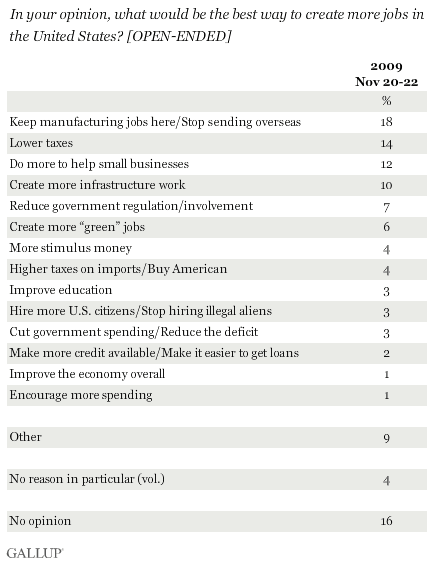PRINCETON, NJ -- As President Obama holds a jobs summit Thursday to discuss ways to address the problem of growing unemployment in the United States, Americans' top prescriptions for creating more jobs are to keep manufacturing jobs in the U.S. (18%), lower taxes (14%), provide more help to small businesses (12%), and create more infrastructure work (10%).
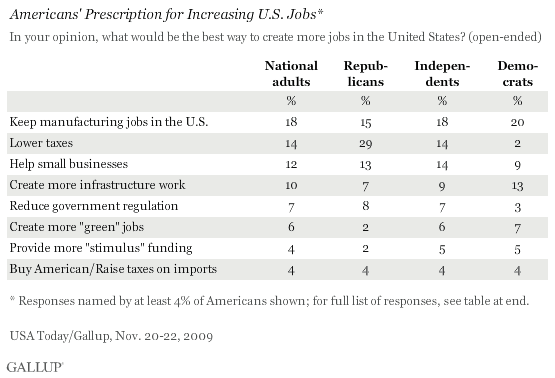
The results are from an open-ended question asked in a USA Today/Gallup poll conducted Nov. 20-22, 2009. Additional tactics cited by at least 4% of Americans include reducing government regulations on business (7%), creating more green jobs (6%), providing more federal stimulus funding (4%), and implementing more pro-"buy American" policies (4%).
"The main factor in public perceptions of a jobs recovery also appears to be politics."
These ideas are strongly related to partisanship. Democrats are somewhat more likely than Republicans to focus on keeping manufacturing jobs in the U.S. and creating certain types of jobs (infrastructure work and green jobs). Republicans are significantly more likely than Democrats to favor lowering taxes and reducing government regulation.
The Jobs Outlook Over the Next Year
Americans offer mixed forecasts for what will happen to the U.S. job market over the next year. Twenty-eight percent predict it will get worse while slightly more, 35%, say it will get better, and 36% think it will stay the same. At the extremes of this spectrum, however, more than twice as many Americans foresee the job market getting "a lot worse" as say it will get "a lot better" -- 14% vs. 6%, respectively.
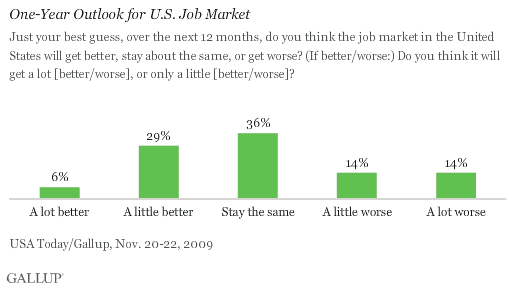
These perceptions overlay Americans' fundamentally bad views of where the job market currently stands. In mid-November, Gallup found a record-low percentage of Americans -- 8% -- saying now is a good time to find a quality job. In this context, maintaining the current jobs climate could be perceived as a negative forecast.
The main factor in public perceptions of a jobs recovery also appears to be politics -- a finding that suggests Americans consider their jobs outlook to be a referendum on the Obama administration's economic policies. Republicans and independents are more likely to believe the job market will get worse, rather than better, over the next year, while an outright majority of Democrats say it will get better.
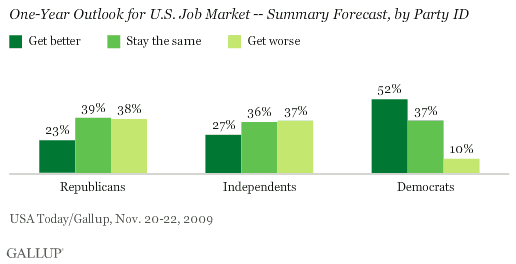
Gallup finds little differentiation in these views by gender and income. There are only slight differences by educational background, region and age, with college graduates, Easterners, and younger adults (aged 18 to 34) showing the most optimism.
On balance, most of the major demographic groups (aside from political ones) believe the job market is more likely to improve than to get worse over the next year, but by fairly slim margins.
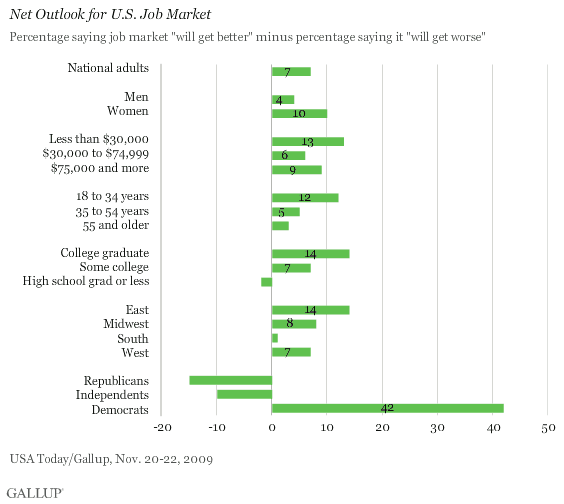
Bottom Line
With the official unemployment figure now topping 10% nationwide, a lack of jobs threatens to send the American economy into a deeper recession at a time when other aspects of the economy are struggling to recover. Americans' top prescriptions for creating more jobs are instituting greater protections for U.S. manufacturing, lowering taxes, helping out small businesses, and creating more infrastructure work. Democrats largely favor more government involvement in terms of protectionism, stimulus spending, and shovel-ready jobs. Republicans tend to favor a free-enterprise approach, exemplified by lowering taxes and reducing government regulation.
Just over a third of Americans predict the job market won't change much in the next year -- not a particularly positive sentiment given the current climate. Of the remainder who believe the job market will change, most -- 43% of all Americans -- foresee fairly small changes (either improvement or decline). However, a combined 20% believe it will change a lot, with most of these saying the problems will deepen rather than improve.
Survey Methods
Results are based on telephone interviews with 1,017 national adults, aged 18 and older, conducted Nov. 20-22, 2009. For results based on the total sample of national adults, one can say with 95% confidence that the maximum margin of sampling error is ±4 percentage points.
Interviews are conducted with respondents on land-line telephones (for respondents with a land-line telephone) and cellular phones (for respondents who are cell-phone only).
In addition to sampling error, question wording and practical difficulties in conducting surveys can introduce error or bias into the findings of public opinion polls.
